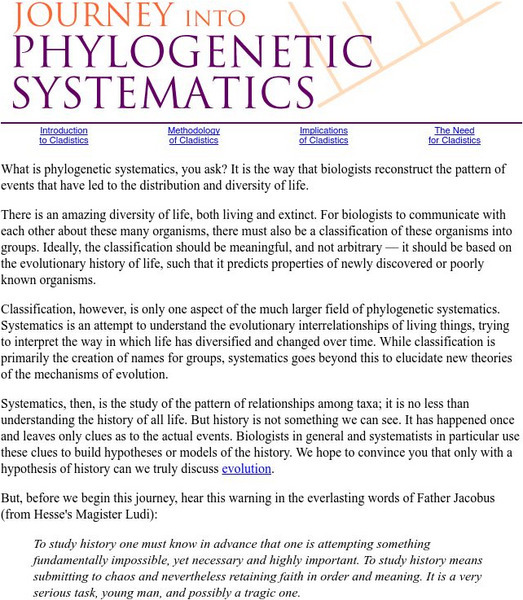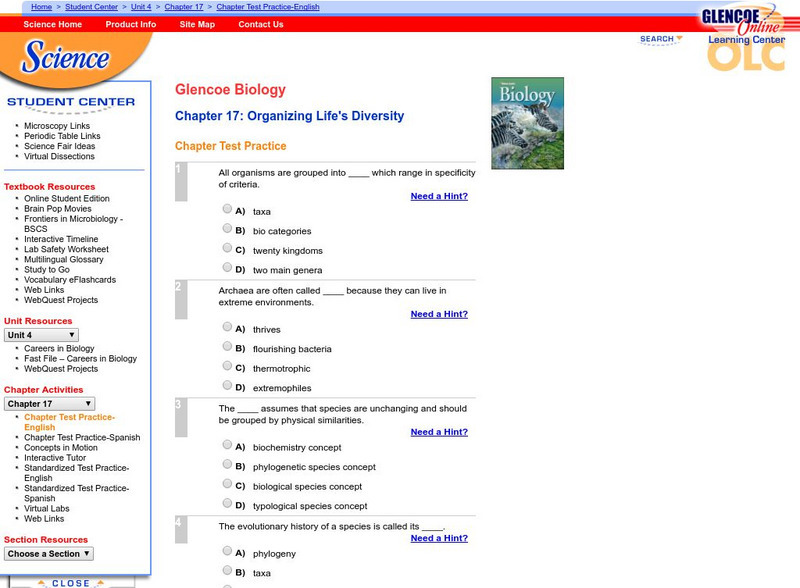Curated OER
Understanding Cladistics
Students explore cladistics and create a cladogram of their own. They are shown how the scientist at the American Museum of Natural History use a method called cladistics to group animals. Students are asked how the animals (lion,...
Curated OER
A Phylogenetic Perspective for the Cladistically Challenged
High schoolers observe the structures of skulls as presented in drawings, and determine which are most closely related to the skull of the mosasaur.
Curated OER
WHAT, IF ANYTHING, IS A ZEBRA?
Students read the essay, "What, If Anything, Is a Zebra?" following a teacher made reading guide. They investigate cladistics, shared derived characteristics, with further online research to enhance their study of evolution and...
Curated OER
Cladistics Is a Zip...Baggie
Students explore how the grouping of organisms based on their shared derived characters forms the basis of a cladogram.
Biology Pages
Kimball's Biology Pages: Cladistics
This page discusses how the cladistic level of classification includes information from molecular biology to establish evolutionary relationships. The page discusses how this information is used to do this.
City University of New York
Classification: Bringing Order Out of Chaos
A self-directed module on all aspects of biological classifications that covers the species problem, diversity and chaos, cladistics, putting things in groups, and so on.
New York University
Classification
These lecture notes describe the techniques used in traditional systematic classification systems and compare them with the most modern approaches to classification.
Science Buddies
Science Buddies: Investigate Native Plant Evolution With Chloroplast Sequencing
Most native plants are not very well studied. One way we learn more about these plants is by studying the species of plants they are most closely related to. In this science project you will sequence part of the chloroplast genome from a...
Estrella Mountain Community College
Estrella Mountain College: Classification
Discusses many aspects of information pertainingto organism classification. Provides links to other areas in biology as well.
University of California
Ucmp: What Did T. Rex Taste Like?
The title could be slightly misleading for this site. It is actually a teaching and learning module on the science of cladistics. As they go through the module, students will increase their understanding of, and appreciation for, the...
Science Education Resource Center at Carleton College
Serc: Phylogenetics Problems
A lesson plan where students solve problems by using cladistics to determine phylogenies. Problems require that students determine which characteristics are ancestral or derived by looking at both dinosaurs' remains and primate skulls....
Miami University
Miami University: Nuts and Bolts of Classification
Discusses many aspects of taxonomy. Provides a lab activity where students are required to devise a classification scheme for nuts, bolts, and other hardware items.
McGraw Hill
Mc Graw Hill Higher Education: Classification
This site from McGraw-Hill Higher Education provides links to key terms, lecture notes, and readings on classification, as well as questions from Raven and Johnson's textbook reading on classification.
George Washington University
George Washington University: Basics of Cladistic Analysis [Pdf]
This is an advanced level review of cladistic theory and methodology. Some sections are very dense but there are useful sections for teachers and students seeking a better understanding of the topic.
Biology Corner
Biology Corner: Cladogram Analysis
A lesson plan where students analyze a cladogram to understand a derived characteristics between a group of organisms. After analyzing the prepared cladogram, students create their own.
University of California
Cladistics Notes [Pdf]
Describes readings associated with lecture notes on cladistic classification. Provides definitions of many key vocabulary words used with cladistics.
University of California
Ucmp: Phylogenetic Systematics: Evolutionary Trees
This page provides an introduction to phylogenetic systematics, the way that biologists reconstruct the pattern of events that have led to the distribution and diversity of life. A tutorial "journey" into the Introduction, Methodology,...
Estrella Mountain Community College
Online Biology Book: Biological Diversity: Classification
Explore the classification of living things in this online, college-level textbook. Learn about taxonomy and its history through diagrams and descriptive information.
Open Curriculum
Open Curriculum: Phylogenetic Classification
An illustrated article helps students understand the concept of phylogenetic classification.
McGraw Hill
Glencoe Biology: Organizing Life's Diversity: Chapter Test Practice
A fifteen question chapter review covering concepts of the classification of life.
McGraw Hill
Glencoe Biology: The History of Classification: Self Check Quiz
Answer these five multiple-choice questions about the history of classification of living things. After answers are submitted, students can review their mistakes.
University of California
Understanding Evolution: The History of Life: Looking at the Patterns
See how scientists use cladistics to study evolutionary relationships.
Biology 4 kids
Biology4 Kids: Rules of Taxonomy
A short informational piece which provides a clear description of the scientific identification system for all species.
CK-12 Foundation
Ck 12: Biology: Phylogenetic Classification
[Free Registration/Login may be required to access all resource tools.] Introduces phylogenetic classification and compares it with the Linnaean classification.






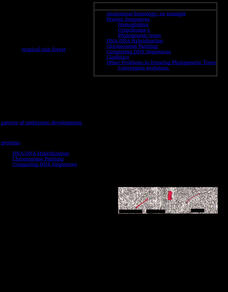

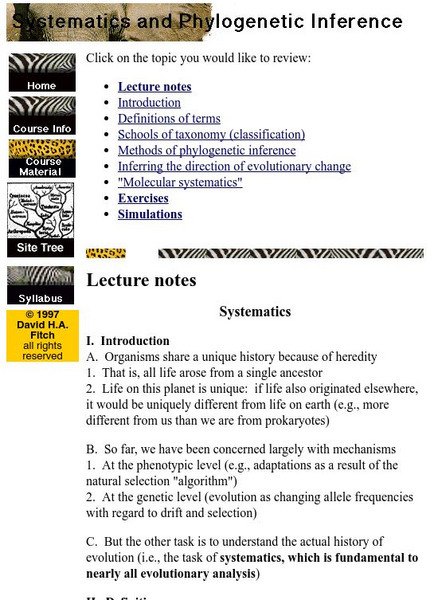

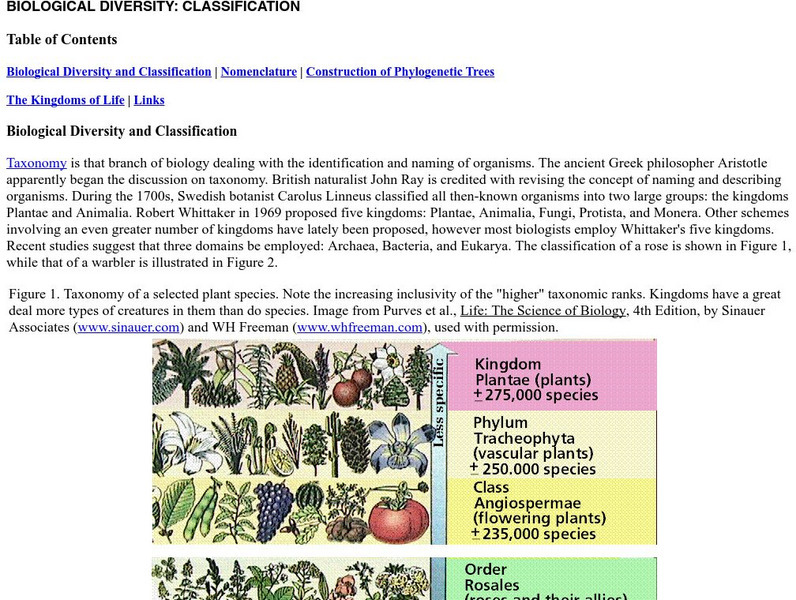
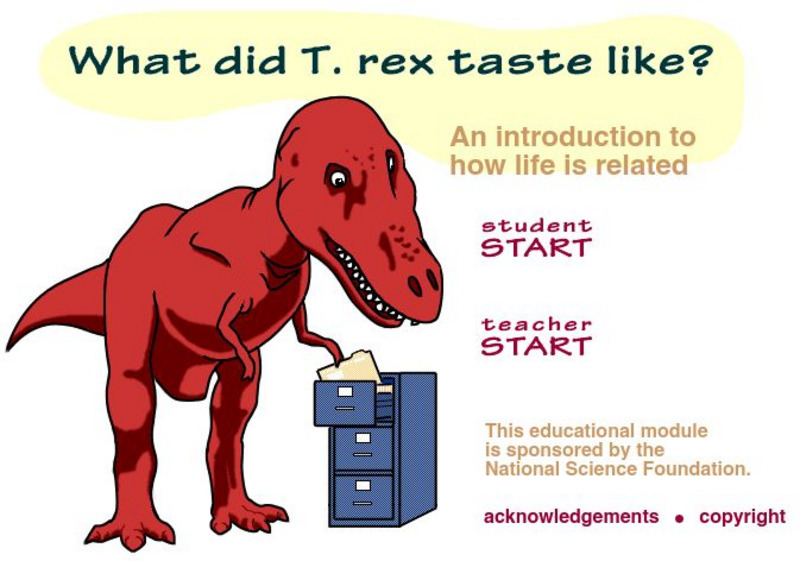



![George Washington University: Basics of Cladistic Analysis [Pdf] eBook George Washington University: Basics of Cladistic Analysis [Pdf] eBook](https://d15y2dacu3jp90.cloudfront.net/images/attachment_defaults/resource/large/FPO-knovation.png)
